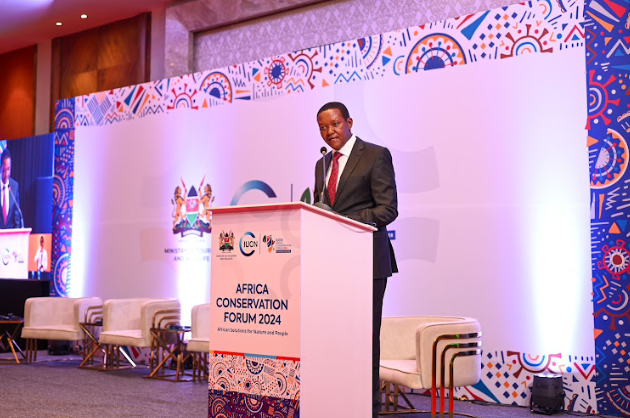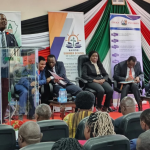During the opening ceremony of the International Union for Conservation of Nature Africa Conservation Forum in Nairobi, Tourism and Wildlife CS Alfred Mutua underscored the government’s commitment to involving local communities and youth in all conservation initiatives.
The forum, themed “African Solutions for Nature and People: Creating Transformative Responses to Africa’s Biodiversity and Climate Crisis,” convened over 500 delegates including IUCN members and stakeholders from across Africa and beyond.
Mutua emphasized that for conservation to be effective and sustainable, local communities must not only be engaged but also be the primary beneficiaries. He highlighted the importance of empowering youth to actively participate in and derive meaningful benefits from conservation activities.
Established in 1948, IUCN is the world’s largest environmental network, comprising over 1,400 member organizations and approximately 16,000 experts, playing a pivotal role in conservation data, assessments, and international standards.
Acknowledging Kenya’s challenges such as increasing human-wildlife conflicts and inadequate funding for conservation, Mutua advocated for innovative partnerships to bolster Africa’s conservation efforts.
The forum serves as a platform to discuss biodiversity, conservation, and sustainable development challenges faced by the continent, aiming to foster collaborative solutions across diverse stakeholders.
“Kenya, with its rich biodiversity, is actively implementing the National Biodiversity Strategy and Action Plan, focusing on locally led and appropriate solutions for nature and people,” Mutua said.
The state is yet to pay up compensation claims to the victims of human-wildlife conflict running to billions.
Mutua said the country is also faced with inadequate financing for the effective management of protected and conserved areas, declining species and environmental degradation of key tourism resources among others.
“This calls for innovative approaches and partnerships to unlock the endless opportunities that support livelihoods, develop local economies, and preserve the rich wildlife and environment while strengthening the strong and enduring cultural ties between the people of this country and the wildlife and habitats we share, creative approaches and partnerships with a variety of stakeholders, including the private sector, are required,” he said.
IUCN President Razan Al Mubarak expressed satisfaction with the increasing recognition of the imperative for inclusive conservation in Africa. She noted the significant engagement of numerous organizations and individuals in working towards the common goal of ensuring equity, justice, and rights in conservation efforts.
Dr. Grethel Aguilar, IUCN Director General, highlighted the historical significance of holding the forum as a unified African continent for the first time. She emphasized the collective strength and unity of African voices in addressing conservation challenges, stressing that people must be central to conservation actions. Aguilar underscored the importance of creating solutions that benefit both people and nature, while respecting the rights of indigenous peoples and local communities.
The forum provides participants with a platform to leverage IUCN’s influence and amplify their voices to shape regional and global conservation policies. It is part of IUCN’s series of Regional Conservation Fora held worldwide this year, aiming to set the agenda for the IUCN World Conservation Congress scheduled for 2025 in the United Arab Emirates. This congress plays a crucial role in determining the global conservation priorities for the coming years.
Previously, IUCN’s sub-regions in Africa—Eastern and Southern Africa, West and Central Africa, and the Centre for Mediterranean Cooperation—held separate Regional Conservation Fora. Inspired by the success of the inaugural IUCN Africa Protected Areas Congress in Kigali, Rwanda, in July 2022, IUCN has consolidated these efforts into a single forum for the entire continent this year.



